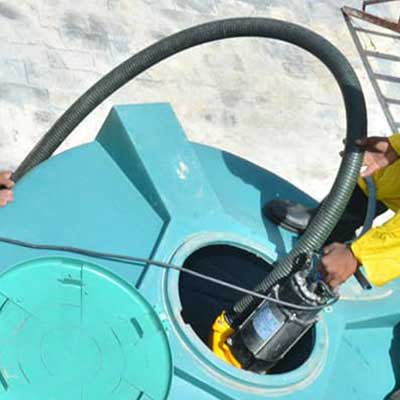Water tank cleaning services are essential for maintaining the quality of the water we use in our homes, businesses, and industries. Over time, water tanks can accumulate sediment, sludge, and contaminants, which not only affect the taste and odor of the water but also pose serious health risks. Regular cleaning and maintenance of water tanks are crucial to ensure the supply of clean, safe, and potable water to our households and facilities.
Why water tank cleaning is very important?
Water is one of our most precious resources, and its quality is of utmost importance to ensure the health and well-being of individuals and communities. Water tanks, whether they are used for domestic, commercial, or industrial purposes, play a pivotal role in storing and distributing water to meet our daily needs. However, these tanks can become breeding grounds for bacteria, algae, and other contaminants, compromising the quality of the water they hold.
1. Health and Safety:
Regular water tank cleaning services are essential for safeguarding public health. Contaminated water can lead to a range of waterborne diseases, including cholera, typhoid, and gastroenteritis. These diseases can have severe consequences, particularly in vulnerable populations, such as children, the elderly, and those with compromised immune systems. By maintaining clean water tanks, we reduce the risk of waterborne illnesses and protect the well-being of our communities.
2. Water Quality:
Clean water is not only crucial for drinking but also for various domestic and industrial processes. Contaminants in water can affect its taste, odor, and color, making it unpalatable and unsuitable for consumption or other applications. Water tank cleaning services ensure that the water stored in these tanks remains pure and free from impurities, meeting the required quality standards.
3. System Efficiency:
Clean water tanks also contribute to the efficiency of water distribution systems. Sediment and sludge buildup can clog pipes, pumps, and filters, reducing the flow rate and increasing energy consumption. Regular cleaning helps maintain the optimal functioning of the entire water supply infrastructure, saving both water and energy resources.
4. Compliance with Regulations:
Many regulatory bodies and health authorities have strict guidelines and standards for water quality and tank maintenance. Failure to adhere to these regulations can lead to fines, legal issues, and reputational damage for businesses and organizations. Professional water tank cleaning services ensure compliance with these regulations, providing peace of mind for homeowners, businesses, and facility managers.
5. Environmental Impact:
Proper water tank cleaning practices also have a positive environmental impact. Regular maintenance reduces the need for chemical disinfection and minimizes the release of harmful contaminants into the environment. Additionally, it helps conserve water resources by preventing water wastage due to system inefficiencies.
Process of Water Tank Cleaning:
Cleaning a water tank is essential to ensure the water stored in it remains safe and free from contaminants. Regular cleaning helps prevent the growth of bacteria, algae, and the accumulation of sediments. Here is a step-by-step guide on how to clean a water tank:
Before You Begin:
Safety Precautions: Ensure your safety by wearing appropriate personal protective equipment (PPE), including gloves, eye protection, and a mask.
Water Supply: Before cleaning, make sure you have an alternative source of water available for your household needs while the tank is being cleaned.
Cleaning Process:
Turn Off Water Supply: Shut off the incoming water supply to the tank to prevent any new water from entering during the cleaning process.
Drain the Tank:
Open the tap or valve at the bottom of the tank to drain out all the water.
You may need a pump or siphon if the tank is large and the outlet is at a low point.
Remove Sediments:
Use a scoop or a wet-dry vacuum cleaner to remove any accumulated sediments, debris, and sludge from the bottom of the tank.
Be thorough in cleaning the tank's floor and walls.
Scrub the Interior:
Use a stiff brush or scrubbing pad attached to a long handle to scrub the interior surfaces of the tank.
Ensure you reach all corners and crevices, including the roof and the areas around any inlets or outlets.
Rinse Thoroughly:
Rinse the tank with clean water multiple times until the water runs clear, and there are no traces of cleaning agents or debris left.
Disinfection:
To kill any remaining bacteria or pathogens, disinfect the tank. You can use household bleach or a specialized water tank disinfectant.
Follow the manufacturer's instructions for the appropriate dosage of disinfectant based on the tank's size.
Mix the disinfectant with water and distribute it evenly inside the tank. Ensure it comes into contact with all surfaces.
Wait and Circulate:
Allow the disinfectant solution to sit in the tank for a specified period, typically 2-4 hours.
Occasionally open and close the tank's outlet valve to circulate the solution throughout the tank.
Flush and Rinse:
After the waiting period, thoroughly flush the tank with clean water to remove any remaining disinfectant and contaminants.
Continue flushing until the water runs clear and there's no smell of disinfectant.
Inspect for Leaks:
Check the tank for any leaks or damage. Repair any issues if necessary.
Refill the Tank:
Once the tank is clean and free of contaminants, you can start refilling it with fresh, clean water.
Turn On Water Supply:
Turn the water supply back on to allow the tank to fill.
Monitor Water Quality:
Different Kind of Tanks that we clean as per your demand:
Light Tanks:
medium Tanks
Heavy Tanks
Super Heavy Tanks
Underground Water Tank
Concrete Tanks
Overhead Water Tank
Also other kind of tanks
Today in this busy and hectic lifestyle people are interested to have all the water tank cleaning services near their places. We, Cleaning Boss provide the best water tank cleaning services in Greater Noida.

